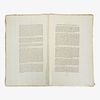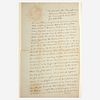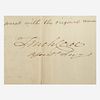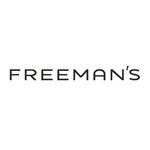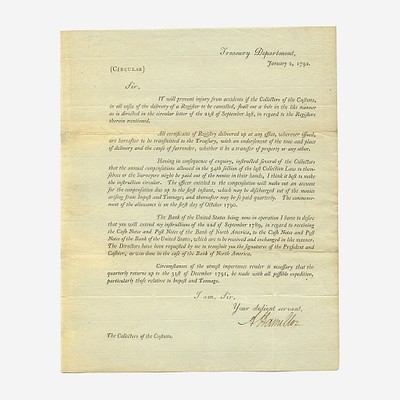[Hamilton, Alexander] [Coast Guard] An Act to provide more effectually for the Collection of the Duties imposed by Law on Goods, Wares and Merchandize
About Seller
2400 Market St
Philadelphia, PA 19147
United States
Established in 1805, Freeman’s Auction House holds tradition close, with a progressive mind-set towards marketing and promotion, along with access to a team of top experts in the auction business. And now with offices in New England, the Southeast, and on the West Coast, it has never been easier to ...Read more
Two ways to bid:
- Leave a max absentee bid and the platform will bid on your behalf up to your maximum bid during the live auction.
- Bid live during the auction and your bids will be submitted real-time to the auctioneer.
Bid Increments
| Price | Bid Increment |
|---|---|
| $0 | $25 |
| $500 | $50 |
| $1,000 | $100 |
| $2,000 | $200 |
| $3,000 | $250 |
| $5,000 | $500 |
| $10,000 | $1,000 |
| $20,000 | $2,000 |
| $30,000 | $2,500 |
| $50,000 | $5,000 |
| $100,000 | $10,000 |
About Auction
Oct 25, 2021
Freeman's is honored to present The Alexander Hamilton Collection of John E. Herzog, a single-owner sale of Alexander Hamilton material, on October 25. Curated by Darren Winston, Head of the Books and Manuscripts Department. Freeman's info@freemansauction.com
- Lot Description
[Hamilton, Alexander] [Coast Guard] An Act to provide more effectually for the Collection of the Duties imposed by Law on Goods, Wares and Merchandize imported in
Alexander Hamilton's Second Tariff Act creates the United States Coast Guard
"Be it further enacted, That the President of the United States be empowered to cause to be built and equipped, so many boats or cutters, not exceeding ten, as may be necessary to be employed for the protection of the revenue..."
(New York): Printed by Francis Childs and John Swaine, (1790). First edition. Folio, 13 1/2 x 8 1/2 in. (343 x 216mm). 41, (1) pp. Printed document, being: "Congress of the United States: at the second session, Begun and held at the City of New-York, on Monday, the Fourth of January, one thousand seven hundred and ninety" Disbound; all edges untrimmed; scattered soiling along edges; scattered spotting to text. Evans 22970
Lot includes a MS. document in a secretarial hand, signed by Assistant Secretary of the Treasury Tench Coxe, being an official copy of a decision by Hamilton in response to a petition filed by traders James Maxwell and Dunken Kelly in the case, the United States vs. Three Hogsheads of Rum, regarding the seizing of their rum at the port of New York; dated November 8, 1791. A letter, also dated November 8, 1791, from Rhode Island judge Henry Marchant to Hamilton writes Dunken Kelly's the name as Dunken "Thelley." Creasing from original folds, first page separated along fold, other separations along folds.
In 1789, Congress passed the first Tariff Act, to both protect developing manufacturing industries at home as well as raise revenue sorely needed by the new federal government, by levying a five percent rate on all foreign goods arriving at U.S. ports. By 1790, Secretary of the Treasury Alexander Hamilton, calculating that the government needed close to $3 million to cover operating costs, and even more to pay down foreign and domestic debts, realized that this rate was too low and sought to raise it closer to ten percent. In order to successfully collect these tariffs against smuggling, Hamilton proposed commissioning a fleet of vessels, called revenue cutters, to patrol the coast and offshore waters of the country in order to intercept contraband and ships looking to avoid the tariff. Page 37 of this act outlines this proposal, and the creation of what would come to be called the Coast Guard (the oldest continuous seagoing service of the United States and eventually the fifth branch of the armed services). It details, among other things, the number of ships to be commissioned, the appointment of Masters and officers, their salaries, as well as their duties, stating that they, "shall have power and authority to go on board every ship or vessel which shall arrive within the United States, or within four leagues of the coast thereof, if bound for the United States, and to search and examine the same and every part thereof, and to demand, receive and certify the manifests herein before required to be on board of certain ships or vessels..."
Hamilton was intimately involved with the creation and functioning of this unit. As Ron Chernow observes, "Hamilton advised Washington to avoid regional favoritism by constructing the first ten revenue cutters in 'different parts of the Union.' Previewing his upcoming industrial policy, he recommended using homegrown cloth for sails rather than foreign fabrics. Once again, an instinct for executive leadership, an innate capacity to command, surfaced in Hamilton. He issued directives of breathtaking specificity, requiring each cutter possess ten muskets and bayonets, twenty pistols, two chisels, one broadax, and two lanterns..." He even went as far as managing the proper conduct of the Masters and crew aboard these ships, advising them to act with the strictest professionalism and conduct so as to avoid turning the public against the institution. Today Hamilton is recognized as the "Father" of the United States Coast Guard.
A fine example.
- Shipping Info
-
No lot may be removed from Freeman’s premises until the buyer has paid in full the purchase price therefor including Buyer’s Premium or has satisfied such terms that Freeman’s, in its sole discretion, shall require. Subject to the foregoing, all Property shall be paid for and removed by the buyer at his/ her expense within ten (10) days of sale and, if not so removed, may be sold by Freeman’s, or sent by Freeman’s to a third-party storage facility, at the sole risk and charge of the buyer(s), and Freeman’s may prohibit the buyer from participating, directly or indirectly, as a bidder or buyer in any future sale or sales. In addition to other remedies available to Freeman’s by law, Freeman’s reserves the right to impose a late charge of 1.5% per month of the total purchase price on any balance remaining ten (10) days after the day of sale. If Property is not removed by the buyer within ten (10) days, a handling charge of 2% of the total purchase price per month from the tenth day after the sale until removal by the buyer shall be payable to Freeman’s by the buyer. Freeman’s will not be responsible for any loss, damage, theft, or otherwise responsible for any goods left in Freeman’s possession after ten (10) days. If the foregoing conditions or any applicable provisions of law are not complied with, in addition to other remedies available to Freeman’s and the Consignor (including without limitation the right to hold the buyer(s) liable for the bid price) Freeman’s, at its option, may either cancel the sale, retaining as liquidated damages all payments made by the buyer(s), or resell the property. In such event, the buyer(s) shall remain liable for any deficiency in the original purchase price and will also be responsible for all costs, including warehousing, the expense of the ultimate sale, and Freeman’s commission at its regular rates together with all related and incidental charges, including legal fees. Payment is a precondition to removal. Payment shall be by cash, certified check or similar bank draft, or any other method approved by Freeman’s. Checks will not be deemed to constitute payment until cleared. Any exceptions must be made upon Freeman’s written approval of credit prior to sale. In addition, a defaulting buyer will be deemed to have granted and assigned to Freeman’s, a continuing security interest of first priority in any property or money of, or owing to such buyer in Freeman’ possession, and Freeman’s may retain and apply such property or money as collateral security for the obligations due to Freeman’s. Freeman’s shall have all of the rights accorded a secured party under the Pennsylvania Uniform Commercial Code.
-
- Buyer's Premium



 EUR
EUR CAD
CAD AUD
AUD GBP
GBP MXN
MXN HKD
HKD CNY
CNY MYR
MYR SEK
SEK SGD
SGD CHF
CHF THB
THB![[Hamilton, Alexander] [Coast Guard] An Act to provide more effectually for the Collection of the Duties imposed by Law on Goods, Wares and Merchandize](https://s1.img.bidsquare.com/item/l/9470/9470924.jpeg?t=1MwoEQ)
![[Hamilton, Alexander] [Coast Guard] An Act to provide more effectually for the Collection of the Duties imposed by Law on Goods, Wares and Merchandize](https://s1.img.bidsquare.com/item/s/9470/9470924.jpeg?t=1MwoEQ)
